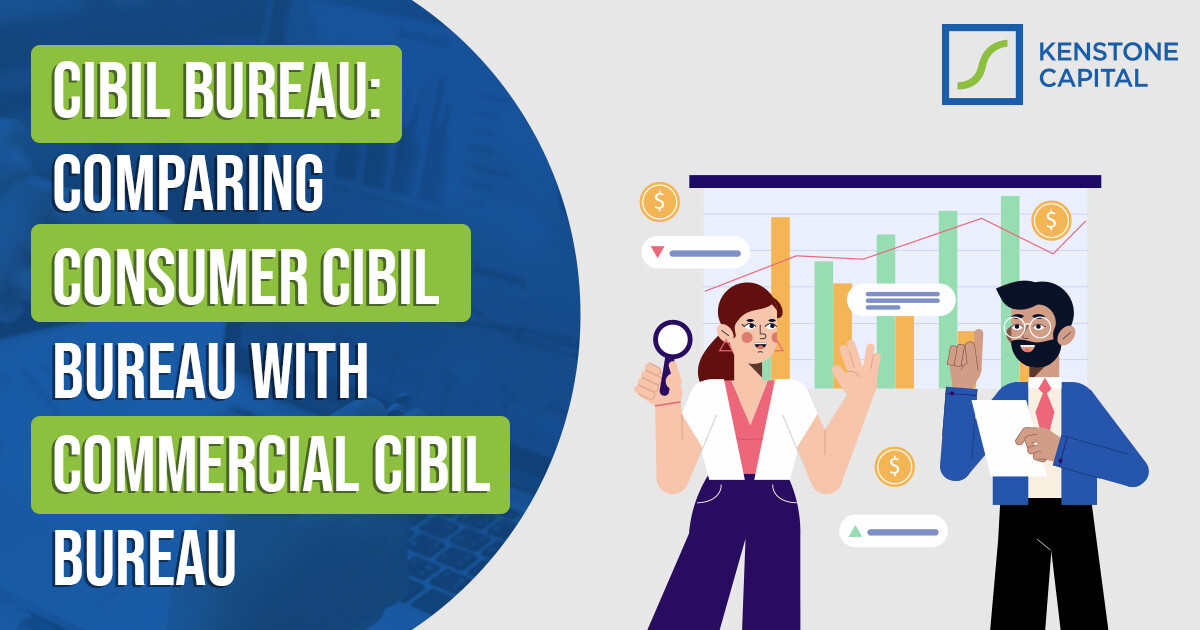CIBIL Bureau: Comparing Consumer CIBIL Bureau & Commercial CIBIL Bureau
When it comes to assessing creditworthiness in India, the CIBIL Bureau plays a pivotal role. The CIBIL report, created by TransUnion CIBIL, is widely recognized as a comprehensive tool for understanding the financial health of an individual or business. The CIBIL score influences decisions for loan approvals, credit cards, and even job opportunities in some sectors.
While most people are familiar with the concept of the CIBIL score for individuals, there is also a separate structure known as the Commercial CIBIL Bureau that evaluates businesses, particularly in the MSME (Micro, Small, and Medium Enterprises) sector. In this blog, we’ll delve deep into comparing the Consumer CIBIL Bureau with the Commercial CIBIL Bureau to understand how they function, their differences, and the impact on loan and credit applications.
1. What is CIBIL?
CIBIL (Credit Information Bureau (India) Limited) is one of the major credit bureaus in India, providing credit reports to individuals, businesses, and financial institutions. The bureau maintains credit records for both consumers (individuals) and commercial entities (businesses), helping lenders assess the creditworthiness of potential borrowers.
2. Understanding the Consumer CIBIL Bureau
Consumer CIBIL Bureau primarily deals with individual credit reports and scores. Every time an individual applies for a loan, credit card, or any form of credit, the lending institutions check the individual’s CIBIL report to evaluate the risk involved in lending to that person.
Here’s a breakdown of how the Consumer CIBIL Bureau works:
- CIBIL Score: This score ranges from 300 to 900. The higher the score, the more likely the individual is to repay debts responsibly. A score closer to 900 indicates strong financial discipline, while a score below 600 may signal a higher risk of default.
- Factors Affecting the CIBIL Score:
- Credit History: A record of past loans and credit repayments, including whether the individual has defaulted on payments or settled loans.
- Outstanding Debt: The total amount of money an individual owes across all credit accounts.
- Credit Utilization Ratio: The percentage of available credit that is currently being used. A high credit utilization ratio can lower the score.
- Credit Enquiries: Multiple inquiries for credit in a short span can negatively impact the score.
- Credit Mix: A balanced mix of secured and unsecured credit can help boost the score.
- Report Components:
- Personal Information: Name, date of birth, and address details.
- Account Information: Loans and credit cards held by the individual, payment history, and current standing.
- Enquiries: A list of companies that have inquired about the individual’s credit score in the last few months.
3. Understanding the Commercial CIBIL Bureau
The Commercial CIBIL Bureau, also known as the CIBIL MSME Rank, focuses on the creditworthiness of businesses, especially MSMEs. This bureau evaluates the financial health of organizations by analyzing data similar to that in the Consumer CIBIL Bureau but applied in the context of commercial activities.
Here’s how the Commercial CIBIL Bureau works:
- CIBIL MSME Rank (CMR): The CMR is a rank given to businesses based on their credit history and financial performance. It ranges from 1 to 10, where 1 is the best possible rank and 10 is the worst. The CMR gives lenders a clear idea of the risk involved when lending to a particular business.
- Factors Affecting the CMR:
- Credit History: The company’s history with loans, repayments, defaults, and any instances of legal actions like bankruptcies.
- Outstanding Debt: The total liabilities of the business and its ability to service them.
- Financial Statements: Revenue, profits, and overall financial health, as well as management practices.
- Payment Behaviour: Whether the business pays its creditors on time or has delayed payments, which can affect its CMR.
- Report Components:
- Company Information: Basic details about the business, such as its legal name, address, and registration number.
- Financial Information: Detailed financial statements, including cash flow, assets, liabilities, and equity.
- Credit History: A history of past and current loans, the status of any outstanding debts, and payment trends.
4. Key Differences Between Consumer CIBIL Bureau and Commercial CIBIL Bureau
At the core, both the Consumer CIBIL Bureau and the Commercial CIBIL Bureau serve similar purposes—evaluating the creditworthiness of a borrower. However, they cater to different segments and have some key differences in how they operate.
A. Nature of Borrower
- Consumer CIBIL Bureau: Deals exclusively with individuals. These are typically people applying for personal loans, credit cards, home loans, or any personal finance product.
- Commercial CIBIL Bureau: Deals with businesses, especially MSMEs. This bureau evaluates how businesses manage their finances, how they’ve repaid loans, and their overall financial health.
B. Scoring System
- Consumer CIBIL Bureau: Uses the CIBIL score, ranging from 300 to 900. Higher scores indicate lower risk and are more favourable in securing loans.
- Commercial CIBIL Bureau: Uses the CIBIL MSME Rank (CMR), which ranges from 1 to 10. A lower rank (closer to 1) indicates a healthier business with a better track record of repaying debts.
C. Factors Considered
- Consumer CIBIL Bureau: Primarily focuses on an individual’s personal financial behaviour, including their credit utilization, loan repayment history, and current outstanding debts.
- Commercial CIBIL Bureau: Focuses more on a company’s financials, such as turnover, assets, liabilities, the management team, and payment behaviour towards suppliers and lenders.
D. Report Contents
- Consumer CIBIL Bureau: The report contains personal details, credit card accounts, loan accounts, credit inquiries, and payment history of the individual.
- Commercial CIBIL Bureau: The report contains business details, financial health, outstanding loans, credit utilization, payment behaviour, and the overall MSME rank based on the business’s credit history.
E. Purpose
- Consumer CIBIL Bureau: The main purpose is to evaluate an individual’s ability to repay loans and manage personal credit responsibly.
- Commercial CIBIL Bureau: Aims to assess the creditworthiness of a business, helping lenders decide whether to extend credit facilities like working capital loans, business loans, or trade credit.
F. Impact of Score/Rank
- Consumer CIBIL Bureau: A high CIBIL score is crucial for getting approved for personal loans, credit cards, and mortgages with favourable terms.
- Commercial CIBIL Bureau: A high CMR can result in lower interest rates, better terms, and quicker loan approvals for businesses, especially MSMEs seeking working capital or expansion loans.
5. Why Are These Credit Reports Important?
For Consumers: A good CIBIL score enables individuals to access loans, credit cards, and mortgages with ease. A higher score also means lower interest rates and better repayment terms. Individuals with a poor score may face challenges in getting credit or may have to accept higher interest rates.
For Businesses: For MSMEs, the CIBIL MSME Rank (CMR) plays a similar role in ensuring that businesses with solid financial history and creditworthiness receive timely access to credit at favourable rates. On the other hand, businesses with poor financial management or a low CMR may find it difficult to secure funding.
6. How to Improve Your CIBIL Score or CMR
- For Consumers:
- Pay your bills on time: Timely payments on loans, credit cards, and utility bills are essential for a positive CIBIL score.
- Keep credit utilization low: Avoid maxing out your credit cards.
- Monitor your credit report: Regularly check your CIBIL report for inaccuracies or fraudulent activities.
- For Businesses:
- Maintain good financial practices: Ensure that your business maintains healthy cash flow, timely debt repayment, and solid financial management practices.
- Minimize outstanding debt: Keep your liabilities in check and avoid excessive borrowing.
- Foster strong relationships with lenders: Work closely with financial institutions and suppliers to build a good payment reputation.
Conclusion
Both the Consumer CIBIL Bureau and the Commercial CIBIL Bureau provide valuable insights into the creditworthiness of individuals and businesses, respectively. While they operate on different criteria—individual financial behaviour vs. business financial health—the core purpose remains the same: helping lenders assess risk and make informed decisions.
For consumers, maintaining a high CIBIL score is critical to access personal finance products, while businesses must focus on maintaining a healthy CIBIL MSME Rank to secure favourable loans and financial support. Whether you are an individual looking for a personal loan or a business aiming to grow, understanding and managing your CIBIL score or MSME Rank is essential for future financial stability.
By regularly monitoring your credit report, staying on top of your financial obligations, and making improvements where necessary, both individuals and businesses can ensure better access to credit and a more robust financial future.




